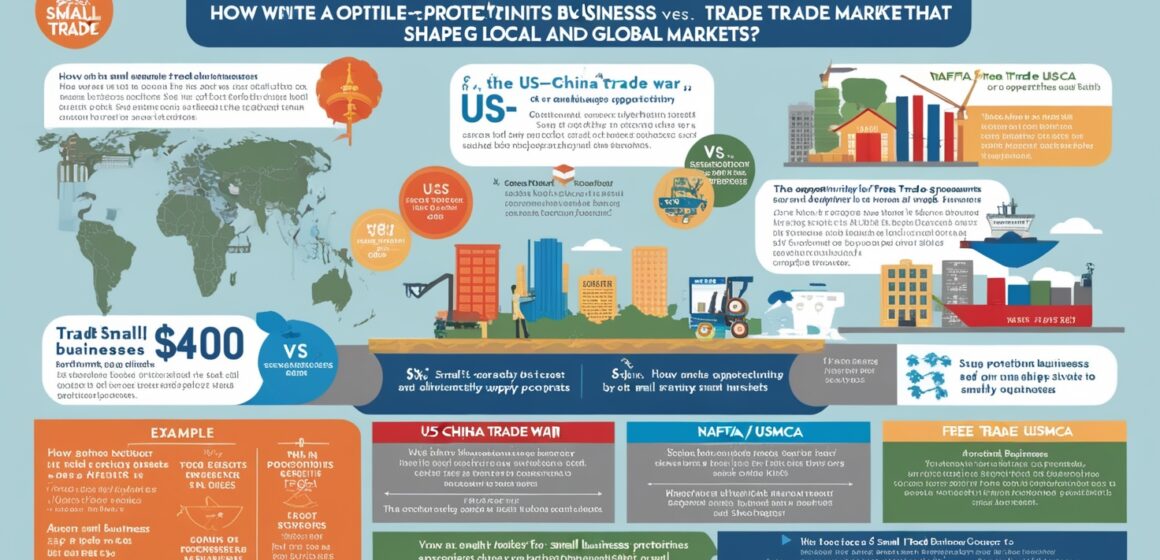Trade policies play a pivotal role in shaping the economic environment, impacting businesses of all sizes. For small businesses, which often operate with limited resources and narrower profit margins, trade policies can be a make-or-break factor. Whether through tariffs, import quotas, or free trade agreements, these policies influence local markets, competitive landscapes, and consumer behavior.
Let’s explore how trade policies affect local small businesses and what strategies they can adopt to navigate these changes.
The Role of Trade Policies
Trade policies govern how goods and services move across borders, aiming to regulate economic interactions between countries. These policies typically fall into two categories:
- Protectionist Policies: Designed to shield domestic industries from foreign competition by imposing tariffs, import quotas, or subsidies for local businesses.
- Free Trade Agreements: Aim to remove barriers to trade, promoting competition and access to international markets.
Both approaches have distinct implications for local small businesses, influencing their operations, pricing, and competitive positioning.
Impact of Protectionist Policies
Advantages for Small Businesses:
- Reduced Foreign Competition: Tariffs and import restrictions limit the influx of cheaper foreign goods, giving local businesses a competitive edge.
- Incentives and Subsidies: Governments often provide subsidies or tax breaks to support small businesses, fostering growth and innovation.
- Boost to Local Economy: Encouraging consumers to buy local products can stimulate the domestic economy, creating jobs and increasing demand for small business goods.
Challenges for Small Businesses:
- Higher Costs of Imports: Tariffs on raw materials can raise production costs, making it harder for small businesses to maintain competitive pricing.
- Retaliatory Tariffs: Other countries may impose their own tariffs, limiting export opportunities for small businesses with global aspirations.
- Market Isolation: Excessive protectionism can isolate local markets, hindering innovation and the adoption of global best practices.
Impact of Free Trade Policies
Advantages for Small Businesses:
- Access to Global Markets: Free trade agreements open doors for small businesses to export their products internationally, expanding their customer base.
- Lower Costs: The removal of tariffs and import duties reduces the cost of acquiring raw materials and goods, improving profit margins.
- Innovation and Competition: Exposure to global competitors encourages small businesses to innovate and improve their offerings.
Challenges for Small Businesses:
- Increased Competition: Free trade exposes small businesses to competition from larger, more established international players.
- Dependence on Global Supply Chains: Disruptions in international trade (e.g., during the COVID-19 pandemic) can create vulnerabilities for businesses reliant on imported goods.
- Price Wars: Competing with cheaper foreign goods can pressure small businesses to lower their prices, potentially eroding profitability.
Real-World Examples
- US-China Trade War: Tariffs imposed during the trade conflict increased costs for small manufacturers reliant on imported Chinese components, forcing some to raise prices or cut margins.
- NAFTA/USMCA: Small businesses in North America benefited from reduced tariffs, gaining easier access to Canadian and Mexican markets for exports.
- European Union’s Single Market: Free movement of goods and services across EU countries has allowed small businesses to expand their operations beyond domestic borders.
Strategies for Small Businesses
To adapt to trade policies, small businesses can adopt the following strategies:
- Diversify Supply Chains: Avoid reliance on a single country for raw materials or products to mitigate the impact of tariffs or trade restrictions.
- Leverage Government Programs: Take advantage of subsidies, grants, or tax incentives offered by local governments to support small businesses.
- Invest in Branding: Position your products as high-quality, local alternatives to foreign imports, appealing to consumers’ preferences for supporting local businesses.
- Focus on Niche Markets: Specialize in unique products or services that face limited competition from imports or international competitors.
- Explore Export Opportunities: Utilize free trade agreements to expand into new international markets and diversify revenue streams.
The Bigger Picture
Trade policies are a double-edged sword for local small businesses. While protectionist measures can provide a buffer against foreign competition, they may increase costs and limit global opportunities. Conversely, free trade promotes access to international markets but intensifies competition and dependence on global supply chains.
Conclusion
For small businesses, staying informed about trade policies and their implications is crucial. By adopting agile strategies and leveraging available resources, small businesses can turn challenges into opportunities. In an interconnected global economy, the ability to adapt to changing trade dynamics will define the success of local markets and the small businesses that drive them.




Leave a Reply